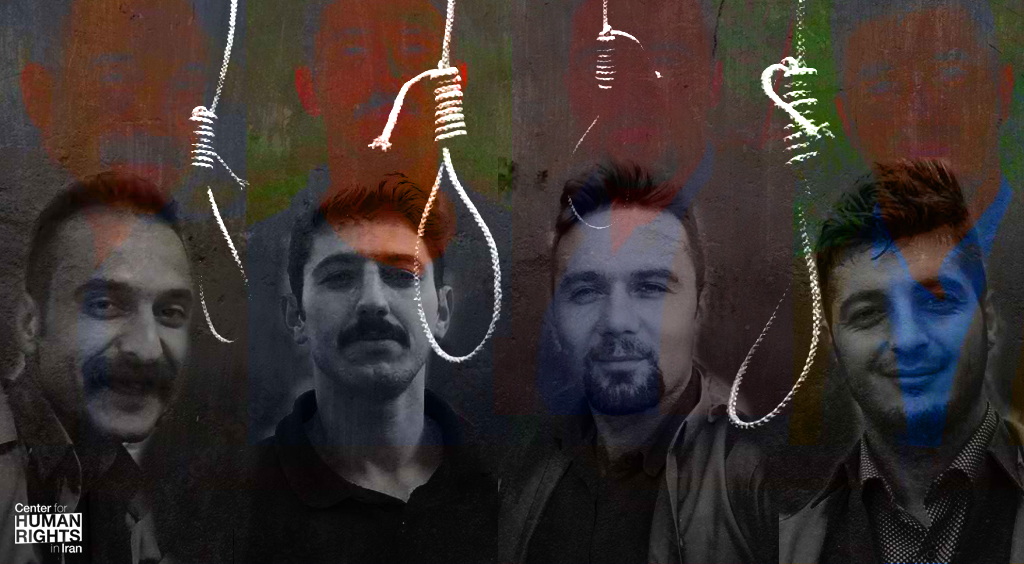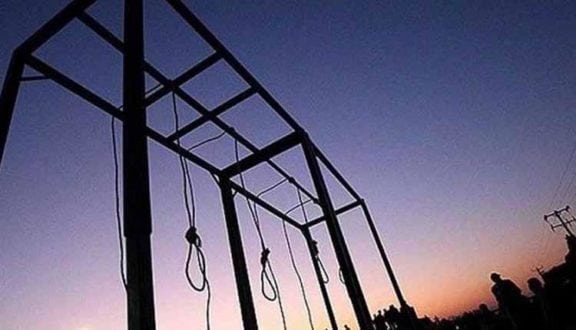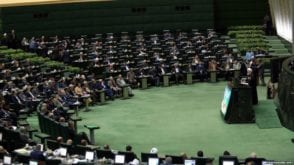CHRI – In the midst of a surge in executions in Iran, four ethnic Kurds are on the brink of execution following 18 months of incognito detention since their arrest in July 2022.

Sentenced to death within 24 hours of a secret trial, there are grave concerns that these political prisoners could face execution without ever being provided a modicum of due process.
Despite threats to silence their families, one of their wives, desperate to see her husband alive again, courageously shared their story with the Center for Human Rights in Iran (CHRI).
“Given the severe violations of due process in this case, and the record of disproportionate and unlawful executions of minorities in Iran, these prisoners demand urgent global attention,” said Hadi Ghaemi, the executive director of CHRI.
Ghaemi added, “World leaders must call on the Iranian authorities to immediately halt their spree of executions or face diplomatic and economic consequences.”
During their brief “trial” at Branch 26 of the Tehran Revolutionary Court, presided over by Judge Iman Afshari, the men were forced to use court-appointed lawyers. The trial details, including specific charges, were veiled in secrecy from the men’s families. To compound matters, the men were denied the right to appeal their death sentences. Instead, within 24 hours, the sentences were confirmed by the Supreme Court, under the jurisdiction of Judge Qasem Mazinani.
The four political prisoners are:
- Mohsen Mazloum, 31, from Mahabad, West Azerbaijan province
- Mohammad Faramarzi, 30, from Dehgolan, Kurdistan province
- Vafa Azarbar, 28, from Bukan, West Azerbaijan province
- Pejman Fatehi, 30, from Kamyaran, Kurdistan province
CHRI urges the UN and global leaders to intensify pressure on the Islamic Republic. They should demand that these men’s death sentences be thrown out and that they be re-tried in public trials with full access to due process.
The global community should also call for the immediate halt to the unlawful and escalating executions in Iran.
CHRI calls on world governments to:
- Summon Iranian ambassadors to directly condemn surging executions and warn that intensified diplomatic and economic isolation will follow the continuation of these unlawful killings;
- Make public statements, unilaterally and in bilateral and multilateral forums, forcefully condemning the surging and unlawful executions in Iran;
- Actively work with allies, partners and other governments to advance joint initiatives that impose diplomatic and economic consequences for these unlawful executions.
Right to Appeal Blocked After Death Sentences Confirmed Within 24 Hours of Issuance
“We were completely unaware of the condition of the prisoners from the day of their arrest until the forced confessions that were aired on TV, Joanna Taimasi, the wife of Mohsen Mazloum, told CHRI. “We had no information about where they were kept.”
“After 80 days, when their forced confessions were broadcast [on state TV], we saw their emaciated and tormented faces that indicated severe physical and mental torture,” said Mazloum, speaking on the phone from a city in Iraq where she fled last year.
In late July 2022, Ministry of Intelligence agents arrested Mazloum, Faramarzi, Azarbar, and Fatehi in the Somay Baradoost border region near Yingjeh village in Iran’s West Azerbaijan province.
Their families and chosen lawyers (as opposed to the court-appointed ones they were forced to use during their trial) were kept uninformed about their whereabouts for 80 days until state media, the Islamic Republic of Iran Broadcasting (IRIB), aired edited footage, purportedly showing them confessing to collaborating with Mossad, the Israeli intelligence service.
Throughout their taped statements, the men were denied the opportunity to speak freely.
The IRIB, which acts as an arm of intelligence and security agencies, has a documented history of airing forced and false “confessions” on state TV, and collaborating with interrogators, intelligence officials, and judiciary officials to obtain and film fabricated confessions. The heavily edited segments serve to propagate scenarios, endorsed by the Intelligence Ministry, aimed at concealing human rights violations and making baseless allegations against defendants held on political charges.
“Only 10 days ago, we learned through our lawyer that death sentences had been issued against them in a secret trial with state-appointed lawyers,” Taimasi told CHRI.
“Despite the verdict, we are still unaware of the case details,” she added. “What’s alarming is that our lawyer revealed the swift confirmation of the death sentences within less than 24 hours of their issuance.”
“On Tuesday, January 16, our lawyer announced that the judicial authorities have rejected the request to review the sentences,” said Taimasi. “They said a judicial review would not be possible because their case is a matter of high national security, and for this reason, their sentences will be enforced, and we should not waste our time.”
Taimasi added that Komala, the political Kurdish organization that the men were accused of collaborating with, officially denied the charges.
“No names were mentioned but Iranian security agencies said they were members of Komala. The Komala Party issued a statement categorically denying the claims made by the Islamic Republic,” she said.
“My husband and his three colleagues were forced to say that they had met with the head of Mossad and other Israeli intelligence officials in South Africa and Botswana, But none of them even have passports. There are many contradictions in their forced confessions.”
Families Denied Contact, Threatened
According to Taimasi’s account to CHRI, the families of all four men received a notification from the Ministry of Intelligence, indicating they could finally meet their loved ones after being apprised of the imminent executions in January 2024. Prompted by this news, families embarked on long journeys from their hometowns to Tehran, converging outside Evin Prison, where the four political prisoners are held.
However, their gathering outside the prison was abruptly obstructed by state security agencies. Subsequently, they were informed that visitation would not take place and were warned to return to Kurdistan. Any persistence in following up or gathering was met with the threat of severe consequences.
Taimasi detailed the coercive tactics employed to silence families grappling with the mass injustice they were enduring:
“In the initial wave of arrests, my brother-in-law, Omid, was also detained and spent 40 days in jail, only to be released on bail amounting to one billion tomans (approximately $19,200). Later, as families assembled in front of the Ministry of Intelligence office in Mahabad, my brother-in-law was promptly summoned and cautioned. Any attempt to publicize the case or sustain protests would result in further arrests and potential death sentences.”
“This period has been incredibly challenging for all families. Mohsen and I had just begun our married life a year before his arrest. Pejman [Fatehi] and his wife have a five-year-old child. In a heartbreaking video, their son pleads for his father’s life, even though he doesn’t fully comprehend the gravity of the situation.”
“We haven’t directly heard their voices even once in this year and a half,” she lamented.
In 2023, more than 700 prisoners were executed in Iran, according to CHRI’s compilation of information from Iranian news agencies and human rights groups. However, these numbers are believed to be higher, given the state’s refusal to accurately disclose them.
The Islamic Republic is one of the few countries in the world that also executes juveniles.
In addition, hundreds of individuals are executed for drug-related offenses that fall short of meeting the “most serious crimes” threshold stipulated by international law.
Moreover, the death penalty is disproportionately applied to ethnic minorities in Iran, illustrating a deeply concerning pattern of injustice.
In recent years, the Islamic Republic has also increasingly used death sentences against political prisoners, after grossly unfair trials.
 Shabtabnews In this dark night, I have lost my way – Arise from a corner, oh you the star of guidance.
Shabtabnews In this dark night, I have lost my way – Arise from a corner, oh you the star of guidance.



